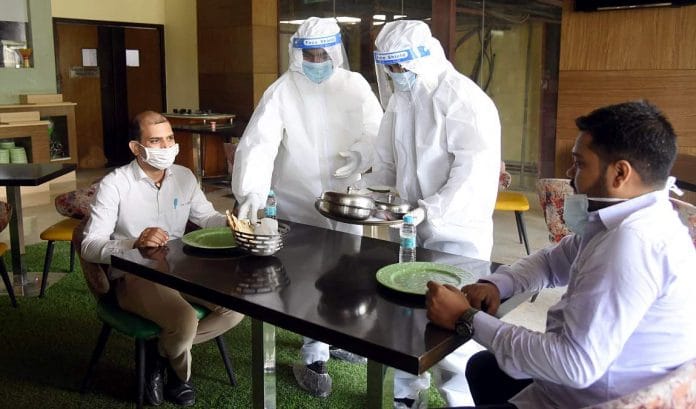New Delhi: Dining or drinking out is a very significant risk factor for infection with SARS-CoV-2 or the novel coronavirus, which causes Covid-19, the US Centers for Disease Control and Prevention (US CDC) has said on the basis of an analysis.
The analysis comes just as restaurants and bars begin to open up in India following the Covid-19 lockdown.
In a first, the study compared Covid patients to a non-Covid control group to link specific community activities such as shopping, visiting a salon, a gym etc to the likelihood of getting the infection. It was conducted by researchers from the CDC’s Epidemic Intelligence Service, besides those from Vanderbilt University Medical Center, Beth Israel Deaconess Medical Center, Wake Forest University Baptist Medical Center, and Hennepin County Medical Center, among others.
According to the analysis, adults detected with the disease are twice as likely to have visited a restaurant or a pub in the two preceding weeks than those that did not have the disease.
This, the researchers said, could be because wearing a mask is not an option while eating or drinking.
“Eating and drinking on-site at locations that offer such options might be important risk factors associated with SARS-CoV-2 infection,” the CDC, the US government health protection agency, said in its morbidity and mortality weekly report.
“Efforts to reduce possible exposures where mask use and social distancing are difficult to maintain, such as when eating and drinking, should be considered to protect customers, employees, and communities.”
Also Read: Delhi pubs reopen with no loud music, AC at 24°C & WhatsApp menus but Delhiites cry ‘freedom’
What study found
The US currently has the most number of Covid-19 cases in the world, followed by India — 66,26,366 and 46,59,984, respectively.
The analysis looked at symptomatic outpatients from 11 US health care facilities, and involved a comparison between Covid patients with a control group comprising symptomatic patients who tested negative for SARS-CoV-2.
Participants were asked about wearing a mask and participation in community exposure activities such as gatherings with 10 or more people in a house, shopping, dining at a restaurant, going to an office setting, salon, gym, bar/coffee shop, or church/religious gathering; or using public transportation) on a five-point Likert-type scale ranging from “never” to “more than once per day” or “always”.
“Close contact with a person with known Covid-19 was more commonly reported among case-patients (42 per cent) than among control-participants (14 per cent),” the analysis stated.
“Case-patients were more likely to have reported dining at a restaurant (any area designated by the restaurant, including indoor, patio, and outdoor seating) in the 2 weeks preceding illness onset than were control-participants… Restricting the analysis to participants without known close contact with a person with confirmed Covid-19, case-patients were more likely to report dining at a restaurant than were control-participants.”
About half of the participants reported shopping and visiting others inside a home (in groups of 10 people or less) on one or more days during the 14 days preceding symptom onset.
Reports of exposures in restaurants, the researchers said, “have been linked to air circulation” too.
“Direction, ventilation, and intensity of airflow might affect virus transmission, even if social distancing measures and mask use are implemented according to current guidance. Masks cannot be effectively worn while eating and drinking, whereas shopping and numerous other indoor activities do not preclude mask use,” wrote the researchers.
Study important as countries begin to open up
The study is part of an effort to assess the relative risks of various levels of opening up — such as restarting schools, colleges and public transport — in the spread of the disease.
The world is waiting on a Covid-19 vaccine but, as the halting of the AstraZeneca-Oxford vaccine trials has shown, a preventive shot may take many more months.
During this time, countries would need to cautiously open up while trying to mitigate casualties because of the disease. India is only just starting a phased reopening of schools for older children.
Also Read: Schools to reopen this month, but parents remain worried & experts advise caution






